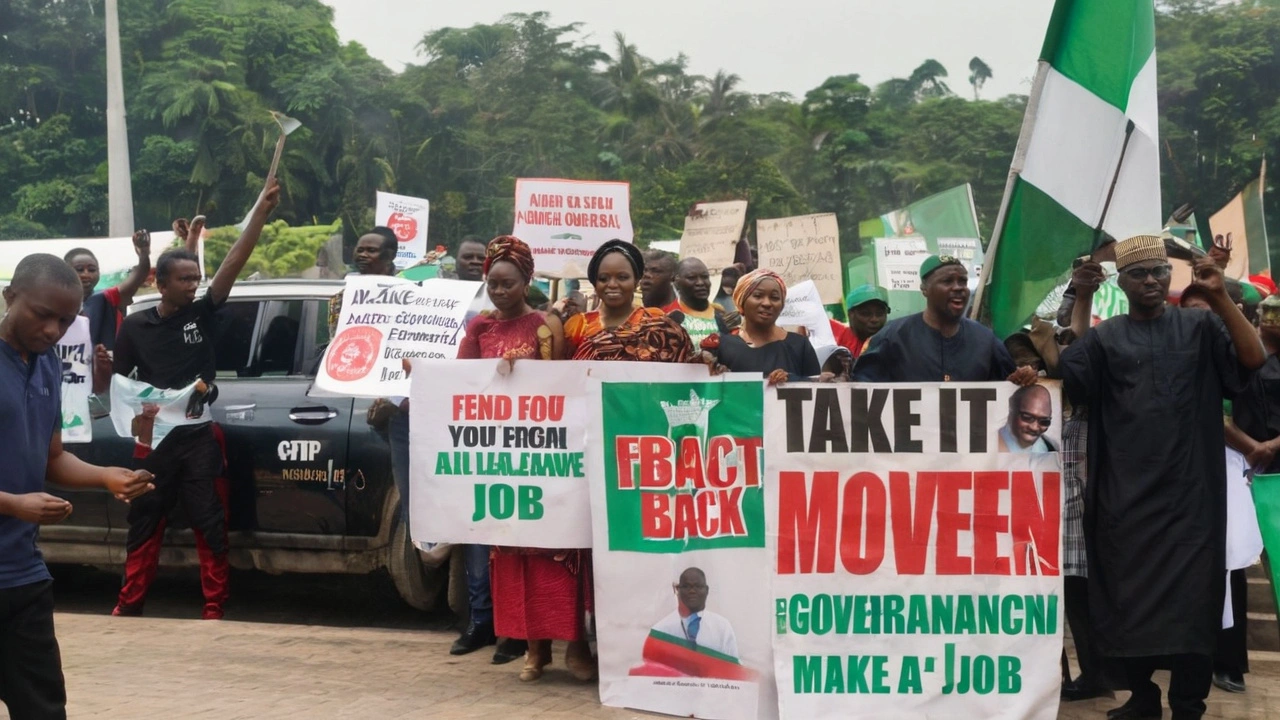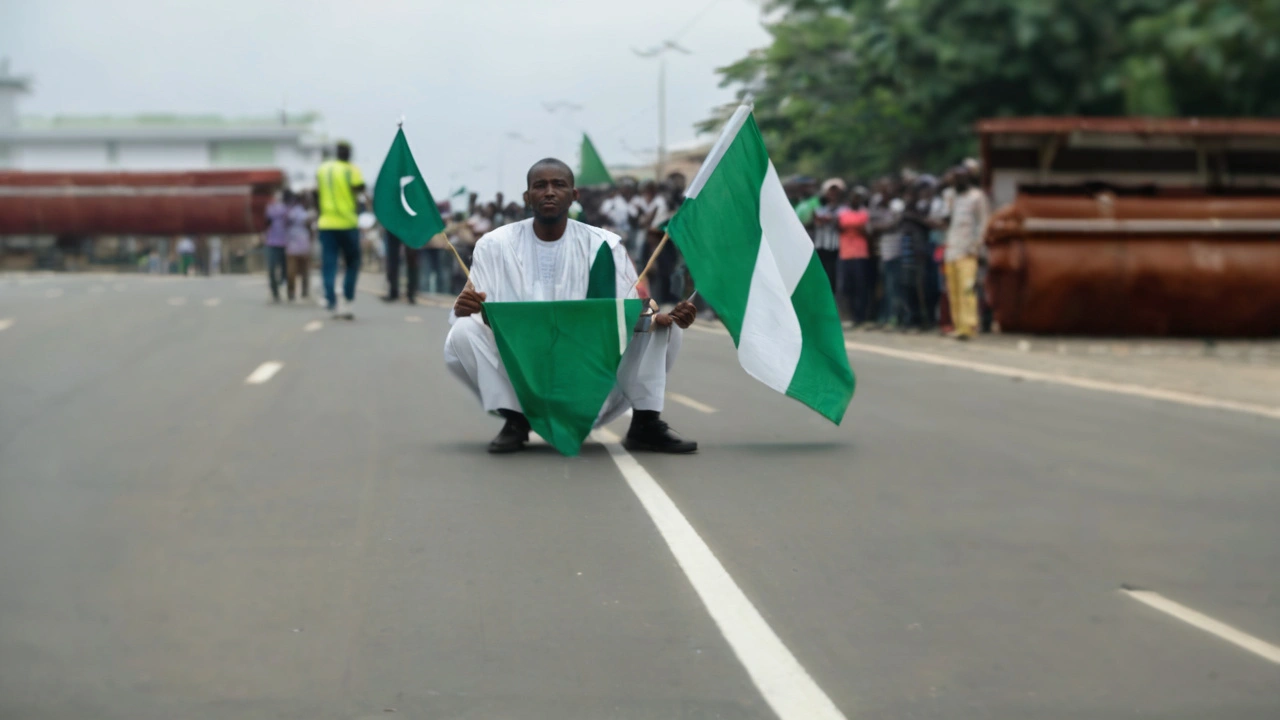Nationwide Protests in Nigeria Ignite Regional Divide Over Tinubu Administration Governance

Nigeria is bracing for a series of nationwide protests that have already stirred significant controversy and regional divides. Scheduled to begin on Thursday, these demonstrations are targeted at expressing widespread dissatisfaction with the current administration led by President Bola Tinubu. Accusations of bad governance are at the heart of these protests, which promise to spotlight critical issues including insecurity, poverty, illiteracy, unemployment, and the high cost of living.
The planned protests have garnered divergent reactions across the country. In northern Nigeria, a cohort of influential leaders has thrown its weight behind the movement. Among them are Professor Usman Yusuf, Hajia Najatu Muhammad, Mallam Salihu Lukman, and Dr. Umar Ardo, who have collectively articulated seven primary demands aimed at improving the nation's governance structure. These demands underscore the urgent need for the government to prioritize the security of life and property, improve the welfare of its citizens, and address the social dislocation wrought by past administrations. The northern elders' support for the protests is grounded in the constitutional right to assembly and the belief that dialogue between the government and the youth is paramount for meaningful reform.
Support from Northern Elders
The northern leadership's backing of the protests signals a serious call for change. Professor Usman Yusuf, a prominent voice in this coalition, has underscored the need for the government to secure the lives and property of its citizens. He emphasizes that the ongoing climate of insecurity has crippled many communities, particularly in the north, making daily life both perilous and unstable. Hajia Najatu Muhammad, another key figure, has stressed the need for significant social and economic reforms, pointing out that the gap between the rich and poor has only widened under successive administrations.
Moreover, Mallam Salihu Lukman and Dr. Umar Ardo have pointed to the critical need for addressing youth unemployment. They argue that the growing number of jobless young people is not only a waste of human potential but also a tinderbox of social instability. Their demands also include enhancing citizens' welfare and correcting the mismanagement that has led to widespread poverty and illiteracy. These leaders believe that by addressing these issues, Nigeria can begin to heal the deep-seated discontent that fuels civil unrest.
The Opposition from the Niger Delta
Contrasting sharply with the support from the north, figures from the Niger Delta have expressed reservations about the protests. Led by the Minister of Niger Delta Development, Abubakar Momoh, the regional leadership has questioned the motivations behind the planned demonstrations. Momoh has suggested that President Tinubu’s initiatives in the Niger Delta region, which he believes should be acknowledged and given time to materialize, are already addressing some of the area's pressing concerns. This stance reflects a more optimistic view of the administration's efforts in the region, albeit one that is not widely shared across Nigeria.
The divergent reactions underscore a deeper, perhaps more complicated, national narrative. For the Niger Delta leadership, the focus is on collaboration and recognition of ongoing efforts rather than confrontation through protests. They argue that constructive engagement with the government is a more pragmatic approach to addressing regional issues.
Government Response and Legal Restrictions
As the country prepares for the protests, the government has not remained passive. Several state governments, along with the Federal Capital Territory (FCT), have secured court orders to restrict the movement of protesters. This move is seen as an attempt to mitigate potential disruptions and maintain public order, although it has sparked debates about the balance between security measures and constitutional rights.
Among the populace, there is a palpable sense of anticipation mixed with uncertainty. Scheduled to run from August 1st to 10th, 2024, the protests' success and impact remain to be seen. Early indications suggest that there might be varying levels of participation across different states, influenced by the local sentiment towards the current government and the logistics involved in organizing such widespread demonstrations.
Core Issues Driving the Protests
The central grievances driving these protests are not new to Nigerians. Insecurity remains a significant issue, particularly in the northern states where insurgent groups have wreaked havoc. The inability of the government to effectively secure these areas has been a major point of contention and despair for many citizens. In tandem with this is the pervasive issue of poverty. Despite Nigeria's vast natural resources, a large proportion of its population lives below the poverty line. This economic disparity has only intensified with rising unemployment rates, especially among the youth.
Education is another critical area of concern. Illiteracy rates remain high, particularly in rural areas, and the education system is often criticized for its lack of resources and poor infrastructure. The high cost of living exacerbates these issues, making everyday life a struggle for many Nigerians. Taken together, these problems paint a picture of systemic failure and corruption, which the protesters argue have been perpetuated by successive governments, including the current administration.
The Call for Dialogue and Reforms
In light of these issues, the northern elders and stakeholders supporting the protests have called for meaningful engagement between the government and the youth. They believe that dialogue is essential for implementing the necessary reforms and ensuring that the government's initiatives translate into tangible benefits for the populace. Their demands for youth empowerment and economic development are particularly poignant, given the demographic makeup of Nigeria, where a significant portion of the population is under 30 years old.
In contrast, the Niger Delta leadership's call for patience and recognition of the administration's efforts highlights a different approach to governance and problem-solving. They argue that sustainable development takes time and that President Tinubu's initiatives are steps in the right direction. This perspective, while valid, clashes with the sense of urgency felt by many protesters who believe that immediate action is necessary to alleviate their plight.

Looking Ahead
As Nigeria stands on the cusp of these significant protests, the country finds itself at a crossroads. The outcome of these demonstrations could potentially reshape the national dialogue around governance and citizen engagement. Whether the government chooses to clamp down on the protests or engage in constructive dialogue will be crucial in determining the path forward.
For now, the eyes of the nation are turned towards Thursday, with a mix of hope and apprehension. The support from northern elders indicates a strong backing for the protests, while the reservations from the Niger Delta suggest that not all regions are aligned in their approach to addressing the country's challenges. The coming days will reveal the strength and resilience of Nigeria's democratic principles and the government's willingness to listen to its people.